BSc Business Management: Coca-Cola Case Study on Marketing Strategies
VerifiedAdded on 2023/01/13
|8
|2309
|54
Case Study
AI Summary
This case study examines Coca-Cola's marketing strategies, focusing on its role in achieving organizational goals and delivering customer value. It analyzes what it means to be market-oriented, discussing how this impacts strategy formulation, implementation, and planning within the Nigerian market. The report highlights the importance of promotional tools, market segmentation, and the marketing mix in building a strong brand image and expanding product portfolios. It further explores the effects of market orientation on Coca-Cola's competitive edge and the importance of adapting strategies to local contexts, such as CSR and cultural differences, to enhance product demand and profitability. The study concludes with the importance of market orientation to meet business goals.
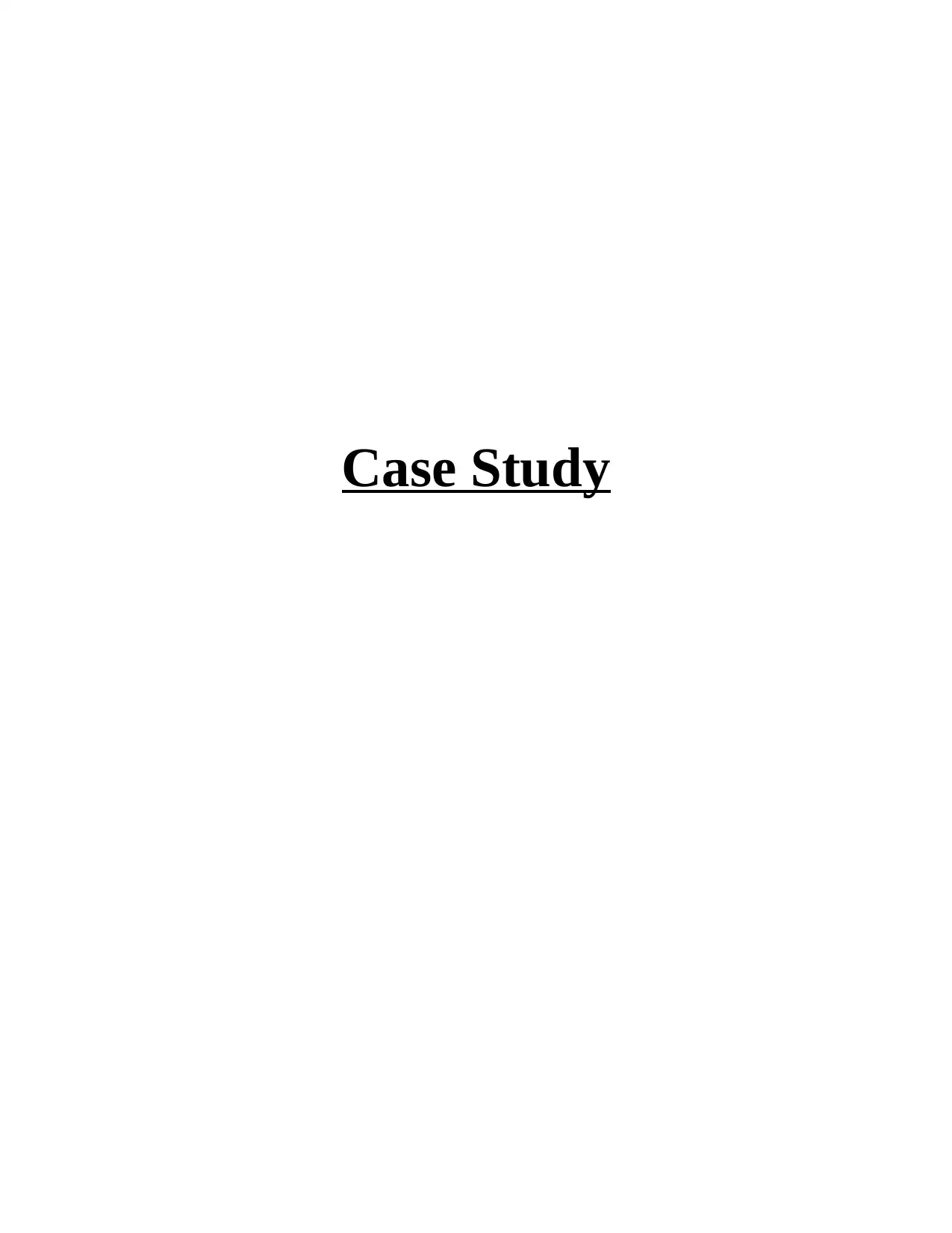
Case Study
Paraphrase This Document
Need a fresh take? Get an instant paraphrase of this document with our AI Paraphraser
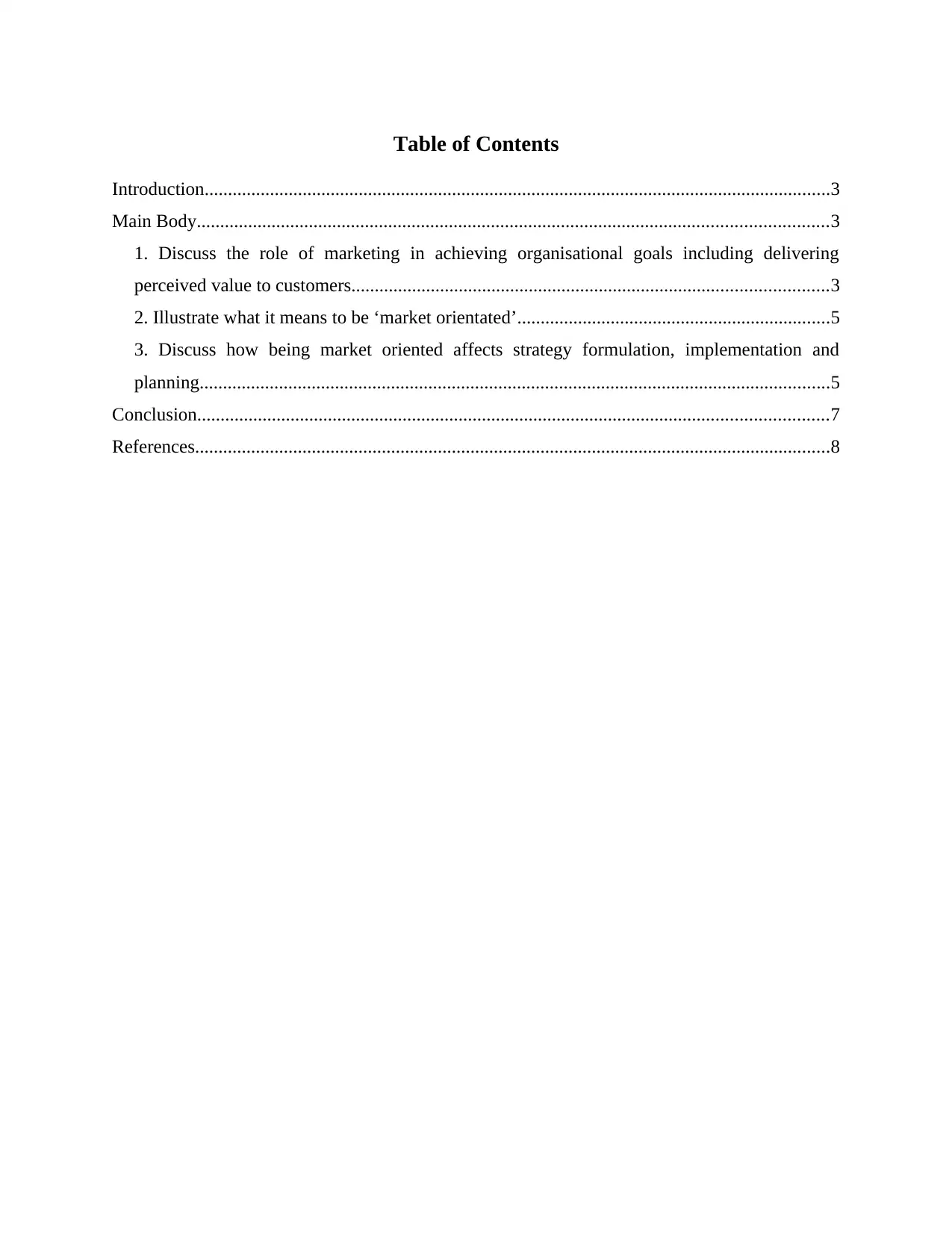
Table of Contents
Introduction......................................................................................................................................3
Main Body.......................................................................................................................................3
1. Discuss the role of marketing in achieving organisational goals including delivering
perceived value to customers......................................................................................................3
2. Illustrate what it means to be ‘market orientated’...................................................................5
3. Discuss how being market oriented affects strategy formulation, implementation and
planning.......................................................................................................................................5
Conclusion.......................................................................................................................................7
References........................................................................................................................................8
Introduction......................................................................................................................................3
Main Body.......................................................................................................................................3
1. Discuss the role of marketing in achieving organisational goals including delivering
perceived value to customers......................................................................................................3
2. Illustrate what it means to be ‘market orientated’...................................................................5
3. Discuss how being market oriented affects strategy formulation, implementation and
planning.......................................................................................................................................5
Conclusion.......................................................................................................................................7
References........................................................................................................................................8
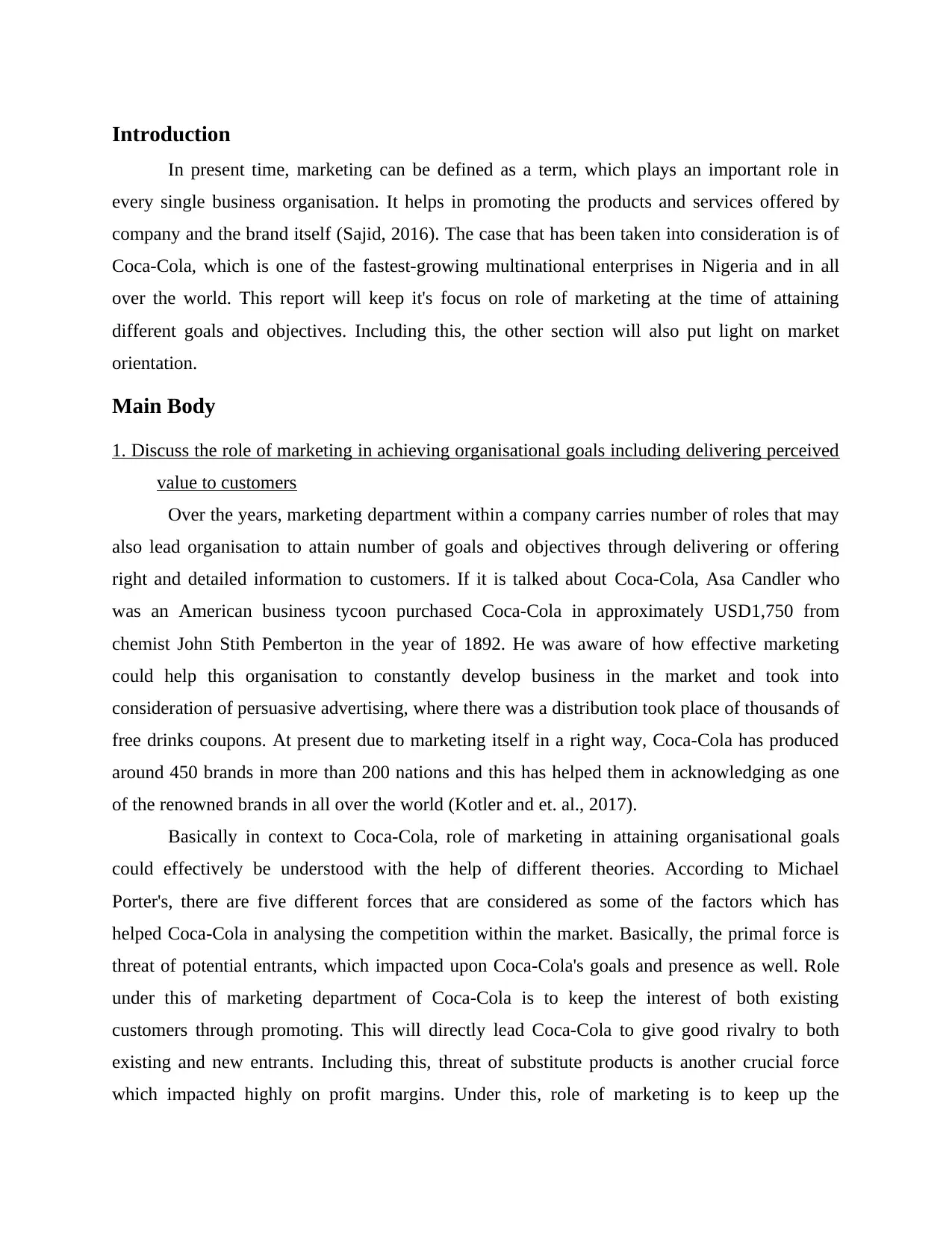
Introduction
In present time, marketing can be defined as a term, which plays an important role in
every single business organisation. It helps in promoting the products and services offered by
company and the brand itself (Sajid, 2016). The case that has been taken into consideration is of
Coca-Cola, which is one of the fastest-growing multinational enterprises in Nigeria and in all
over the world. This report will keep it's focus on role of marketing at the time of attaining
different goals and objectives. Including this, the other section will also put light on market
orientation.
Main Body
1. Discuss the role of marketing in achieving organisational goals including delivering perceived
value to customers
Over the years, marketing department within a company carries number of roles that may
also lead organisation to attain number of goals and objectives through delivering or offering
right and detailed information to customers. If it is talked about Coca-Cola, Asa Candler who
was an American business tycoon purchased Coca-Cola in approximately USD1,750 from
chemist John Stith Pemberton in the year of 1892. He was aware of how effective marketing
could help this organisation to constantly develop business in the market and took into
consideration of persuasive advertising, where there was a distribution took place of thousands of
free drinks coupons. At present due to marketing itself in a right way, Coca-Cola has produced
around 450 brands in more than 200 nations and this has helped them in acknowledging as one
of the renowned brands in all over the world (Kotler and et. al., 2017).
Basically in context to Coca-Cola, role of marketing in attaining organisational goals
could effectively be understood with the help of different theories. According to Michael
Porter's, there are five different forces that are considered as some of the factors which has
helped Coca-Cola in analysing the competition within the market. Basically, the primal force is
threat of potential entrants, which impacted upon Coca-Cola's goals and presence as well. Role
under this of marketing department of Coca-Cola is to keep the interest of both existing
customers through promoting. This will directly lead Coca-Cola to give good rivalry to both
existing and new entrants. Including this, threat of substitute products is another crucial force
which impacted highly on profit margins. Under this, role of marketing is to keep up the
In present time, marketing can be defined as a term, which plays an important role in
every single business organisation. It helps in promoting the products and services offered by
company and the brand itself (Sajid, 2016). The case that has been taken into consideration is of
Coca-Cola, which is one of the fastest-growing multinational enterprises in Nigeria and in all
over the world. This report will keep it's focus on role of marketing at the time of attaining
different goals and objectives. Including this, the other section will also put light on market
orientation.
Main Body
1. Discuss the role of marketing in achieving organisational goals including delivering perceived
value to customers
Over the years, marketing department within a company carries number of roles that may
also lead organisation to attain number of goals and objectives through delivering or offering
right and detailed information to customers. If it is talked about Coca-Cola, Asa Candler who
was an American business tycoon purchased Coca-Cola in approximately USD1,750 from
chemist John Stith Pemberton in the year of 1892. He was aware of how effective marketing
could help this organisation to constantly develop business in the market and took into
consideration of persuasive advertising, where there was a distribution took place of thousands of
free drinks coupons. At present due to marketing itself in a right way, Coca-Cola has produced
around 450 brands in more than 200 nations and this has helped them in acknowledging as one
of the renowned brands in all over the world (Kotler and et. al., 2017).
Basically in context to Coca-Cola, role of marketing in attaining organisational goals
could effectively be understood with the help of different theories. According to Michael
Porter's, there are five different forces that are considered as some of the factors which has
helped Coca-Cola in analysing the competition within the market. Basically, the primal force is
threat of potential entrants, which impacted upon Coca-Cola's goals and presence as well. Role
under this of marketing department of Coca-Cola is to keep the interest of both existing
customers through promoting. This will directly lead Coca-Cola to give good rivalry to both
existing and new entrants. Including this, threat of substitute products is another crucial force
which impacted highly on profit margins. Under this, role of marketing is to keep up the
⊘ This is a preview!⊘
Do you want full access?
Subscribe today to unlock all pages.

Trusted by 1+ million students worldwide
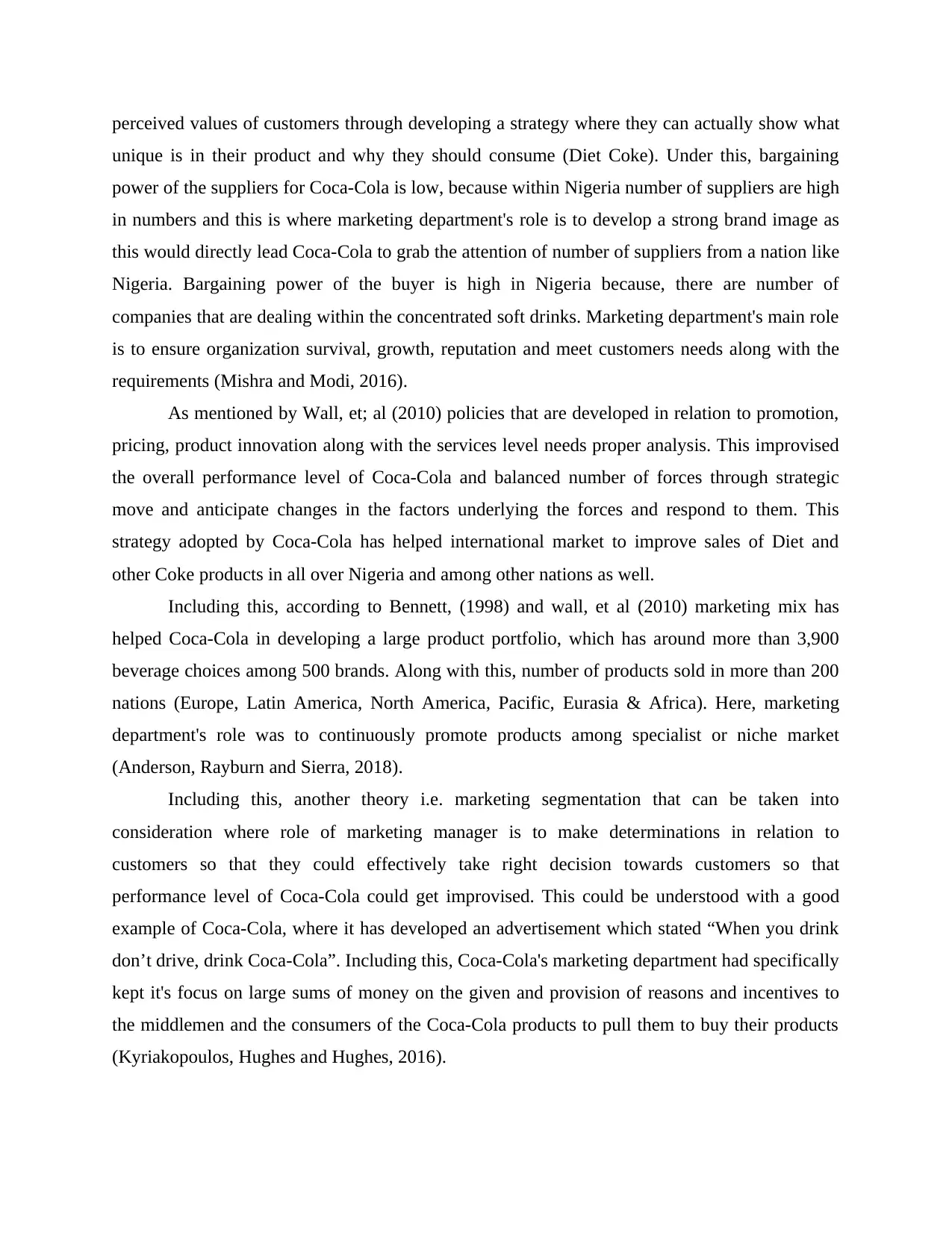
perceived values of customers through developing a strategy where they can actually show what
unique is in their product and why they should consume (Diet Coke). Under this, bargaining
power of the suppliers for Coca-Cola is low, because within Nigeria number of suppliers are high
in numbers and this is where marketing department's role is to develop a strong brand image as
this would directly lead Coca-Cola to grab the attention of number of suppliers from a nation like
Nigeria. Bargaining power of the buyer is high in Nigeria because, there are number of
companies that are dealing within the concentrated soft drinks. Marketing department's main role
is to ensure organization survival, growth, reputation and meet customers needs along with the
requirements (Mishra and Modi, 2016).
As mentioned by Wall, et; al (2010) policies that are developed in relation to promotion,
pricing, product innovation along with the services level needs proper analysis. This improvised
the overall performance level of Coca-Cola and balanced number of forces through strategic
move and anticipate changes in the factors underlying the forces and respond to them. This
strategy adopted by Coca-Cola has helped international market to improve sales of Diet and
other Coke products in all over Nigeria and among other nations as well.
Including this, according to Bennett, (1998) and wall, et al (2010) marketing mix has
helped Coca-Cola in developing a large product portfolio, which has around more than 3,900
beverage choices among 500 brands. Along with this, number of products sold in more than 200
nations (Europe, Latin America, North America, Pacific, Eurasia & Africa). Here, marketing
department's role was to continuously promote products among specialist or niche market
(Anderson, Rayburn and Sierra, 2018).
Including this, another theory i.e. marketing segmentation that can be taken into
consideration where role of marketing manager is to make determinations in relation to
customers so that they could effectively take right decision towards customers so that
performance level of Coca-Cola could get improvised. This could be understood with a good
example of Coca-Cola, where it has developed an advertisement which stated “When you drink
don’t drive, drink Coca-Cola”. Including this, Coca-Cola's marketing department had specifically
kept it's focus on large sums of money on the given and provision of reasons and incentives to
the middlemen and the consumers of the Coca-Cola products to pull them to buy their products
(Kyriakopoulos, Hughes and Hughes, 2016).
unique is in their product and why they should consume (Diet Coke). Under this, bargaining
power of the suppliers for Coca-Cola is low, because within Nigeria number of suppliers are high
in numbers and this is where marketing department's role is to develop a strong brand image as
this would directly lead Coca-Cola to grab the attention of number of suppliers from a nation like
Nigeria. Bargaining power of the buyer is high in Nigeria because, there are number of
companies that are dealing within the concentrated soft drinks. Marketing department's main role
is to ensure organization survival, growth, reputation and meet customers needs along with the
requirements (Mishra and Modi, 2016).
As mentioned by Wall, et; al (2010) policies that are developed in relation to promotion,
pricing, product innovation along with the services level needs proper analysis. This improvised
the overall performance level of Coca-Cola and balanced number of forces through strategic
move and anticipate changes in the factors underlying the forces and respond to them. This
strategy adopted by Coca-Cola has helped international market to improve sales of Diet and
other Coke products in all over Nigeria and among other nations as well.
Including this, according to Bennett, (1998) and wall, et al (2010) marketing mix has
helped Coca-Cola in developing a large product portfolio, which has around more than 3,900
beverage choices among 500 brands. Along with this, number of products sold in more than 200
nations (Europe, Latin America, North America, Pacific, Eurasia & Africa). Here, marketing
department's role was to continuously promote products among specialist or niche market
(Anderson, Rayburn and Sierra, 2018).
Including this, another theory i.e. marketing segmentation that can be taken into
consideration where role of marketing manager is to make determinations in relation to
customers so that they could effectively take right decision towards customers so that
performance level of Coca-Cola could get improvised. This could be understood with a good
example of Coca-Cola, where it has developed an advertisement which stated “When you drink
don’t drive, drink Coca-Cola”. Including this, Coca-Cola's marketing department had specifically
kept it's focus on large sums of money on the given and provision of reasons and incentives to
the middlemen and the consumers of the Coca-Cola products to pull them to buy their products
(Kyriakopoulos, Hughes and Hughes, 2016).
Paraphrase This Document
Need a fresh take? Get an instant paraphrase of this document with our AI Paraphraser
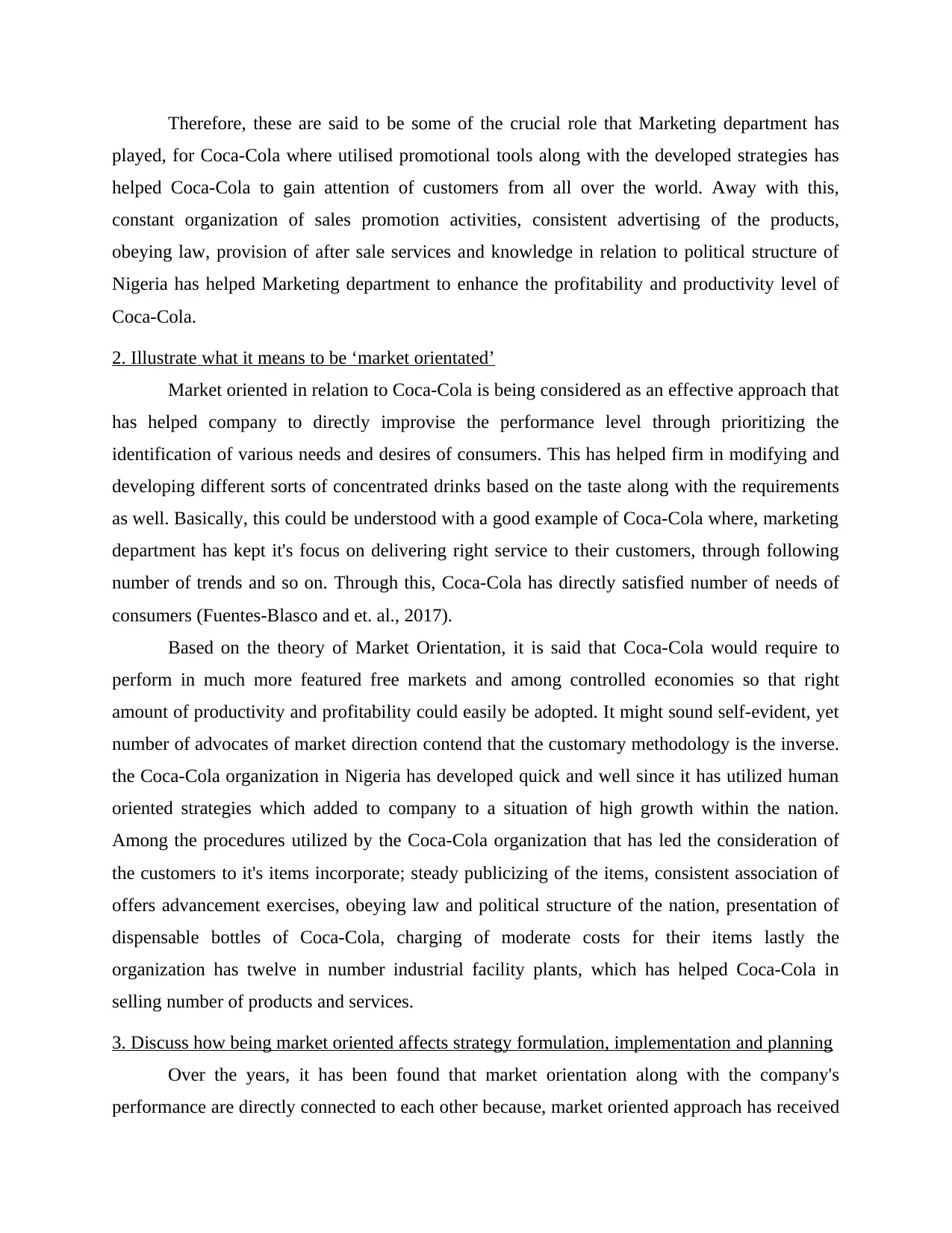
Therefore, these are said to be some of the crucial role that Marketing department has
played, for Coca-Cola where utilised promotional tools along with the developed strategies has
helped Coca-Cola to gain attention of customers from all over the world. Away with this,
constant organization of sales promotion activities, consistent advertising of the products,
obeying law, provision of after sale services and knowledge in relation to political structure of
Nigeria has helped Marketing department to enhance the profitability and productivity level of
Coca-Cola.
2. Illustrate what it means to be ‘market orientated’
Market oriented in relation to Coca-Cola is being considered as an effective approach that
has helped company to directly improvise the performance level through prioritizing the
identification of various needs and desires of consumers. This has helped firm in modifying and
developing different sorts of concentrated drinks based on the taste along with the requirements
as well. Basically, this could be understood with a good example of Coca-Cola where, marketing
department has kept it's focus on delivering right service to their customers, through following
number of trends and so on. Through this, Coca-Cola has directly satisfied number of needs of
consumers (Fuentes-Blasco and et. al., 2017).
Based on the theory of Market Orientation, it is said that Coca-Cola would require to
perform in much more featured free markets and among controlled economies so that right
amount of productivity and profitability could easily be adopted. It might sound self-evident, yet
number of advocates of market direction contend that the customary methodology is the inverse.
the Coca-Cola organization in Nigeria has developed quick and well since it has utilized human
oriented strategies which added to company to a situation of high growth within the nation.
Among the procedures utilized by the Coca-Cola organization that has led the consideration of
the customers to it's items incorporate; steady publicizing of the items, consistent association of
offers advancement exercises, obeying law and political structure of the nation, presentation of
dispensable bottles of Coca-Cola, charging of moderate costs for their items lastly the
organization has twelve in number industrial facility plants, which has helped Coca-Cola in
selling number of products and services.
3. Discuss how being market oriented affects strategy formulation, implementation and planning
Over the years, it has been found that market orientation along with the company's
performance are directly connected to each other because, market oriented approach has received
played, for Coca-Cola where utilised promotional tools along with the developed strategies has
helped Coca-Cola to gain attention of customers from all over the world. Away with this,
constant organization of sales promotion activities, consistent advertising of the products,
obeying law, provision of after sale services and knowledge in relation to political structure of
Nigeria has helped Marketing department to enhance the profitability and productivity level of
Coca-Cola.
2. Illustrate what it means to be ‘market orientated’
Market oriented in relation to Coca-Cola is being considered as an effective approach that
has helped company to directly improvise the performance level through prioritizing the
identification of various needs and desires of consumers. This has helped firm in modifying and
developing different sorts of concentrated drinks based on the taste along with the requirements
as well. Basically, this could be understood with a good example of Coca-Cola where, marketing
department has kept it's focus on delivering right service to their customers, through following
number of trends and so on. Through this, Coca-Cola has directly satisfied number of needs of
consumers (Fuentes-Blasco and et. al., 2017).
Based on the theory of Market Orientation, it is said that Coca-Cola would require to
perform in much more featured free markets and among controlled economies so that right
amount of productivity and profitability could easily be adopted. It might sound self-evident, yet
number of advocates of market direction contend that the customary methodology is the inverse.
the Coca-Cola organization in Nigeria has developed quick and well since it has utilized human
oriented strategies which added to company to a situation of high growth within the nation.
Among the procedures utilized by the Coca-Cola organization that has led the consideration of
the customers to it's items incorporate; steady publicizing of the items, consistent association of
offers advancement exercises, obeying law and political structure of the nation, presentation of
dispensable bottles of Coca-Cola, charging of moderate costs for their items lastly the
organization has twelve in number industrial facility plants, which has helped Coca-Cola in
selling number of products and services.
3. Discuss how being market oriented affects strategy formulation, implementation and planning
Over the years, it has been found that market orientation along with the company's
performance are directly connected to each other because, market oriented approach has received
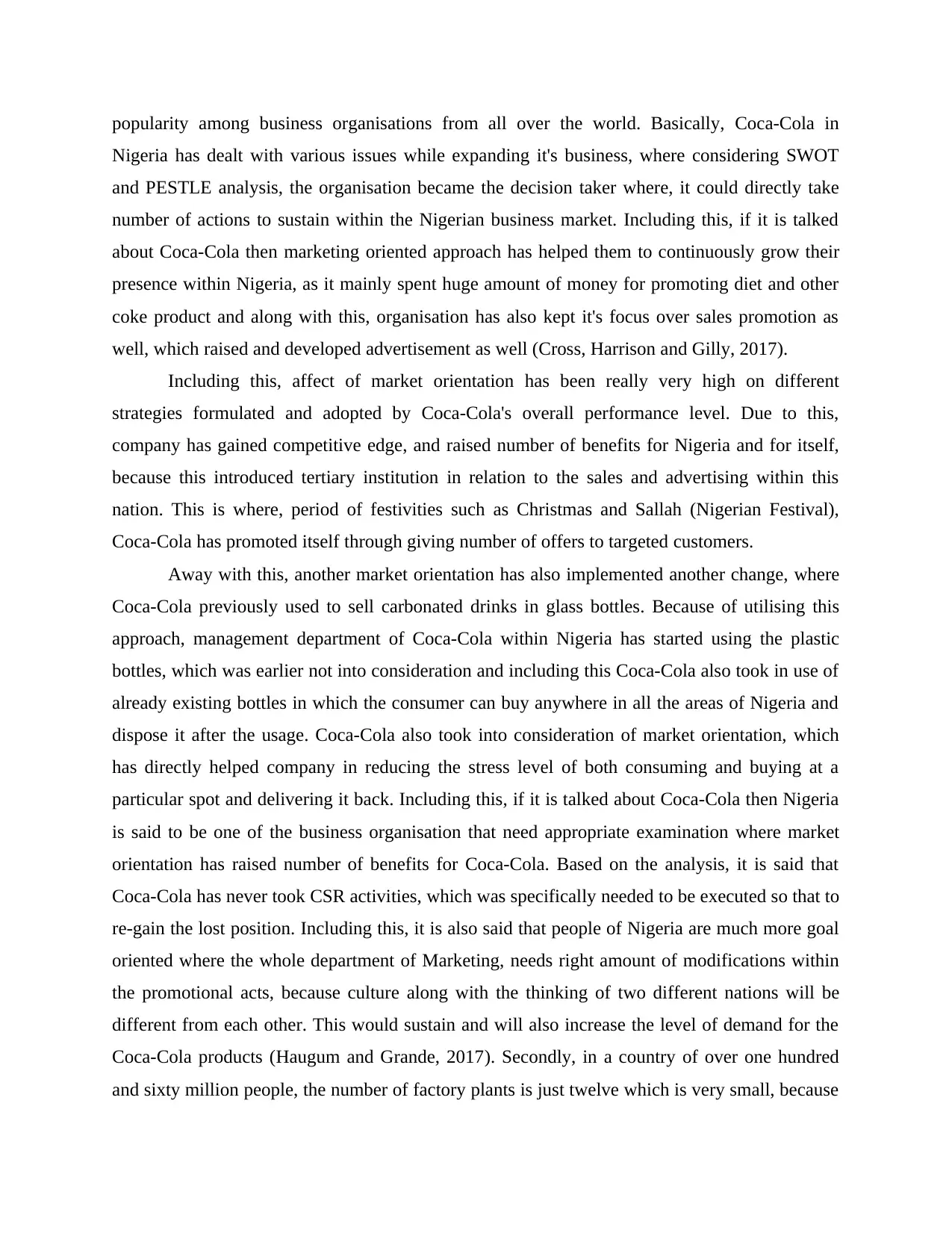
popularity among business organisations from all over the world. Basically, Coca-Cola in
Nigeria has dealt with various issues while expanding it's business, where considering SWOT
and PESTLE analysis, the organisation became the decision taker where, it could directly take
number of actions to sustain within the Nigerian business market. Including this, if it is talked
about Coca-Cola then marketing oriented approach has helped them to continuously grow their
presence within Nigeria, as it mainly spent huge amount of money for promoting diet and other
coke product and along with this, organisation has also kept it's focus over sales promotion as
well, which raised and developed advertisement as well (Cross, Harrison and Gilly, 2017).
Including this, affect of market orientation has been really very high on different
strategies formulated and adopted by Coca-Cola's overall performance level. Due to this,
company has gained competitive edge, and raised number of benefits for Nigeria and for itself,
because this introduced tertiary institution in relation to the sales and advertising within this
nation. This is where, period of festivities such as Christmas and Sallah (Nigerian Festival),
Coca-Cola has promoted itself through giving number of offers to targeted customers.
Away with this, another market orientation has also implemented another change, where
Coca-Cola previously used to sell carbonated drinks in glass bottles. Because of utilising this
approach, management department of Coca-Cola within Nigeria has started using the plastic
bottles, which was earlier not into consideration and including this Coca-Cola also took in use of
already existing bottles in which the consumer can buy anywhere in all the areas of Nigeria and
dispose it after the usage. Coca-Cola also took into consideration of market orientation, which
has directly helped company in reducing the stress level of both consuming and buying at a
particular spot and delivering it back. Including this, if it is talked about Coca-Cola then Nigeria
is said to be one of the business organisation that need appropriate examination where market
orientation has raised number of benefits for Coca-Cola. Based on the analysis, it is said that
Coca-Cola has never took CSR activities, which was specifically needed to be executed so that to
re-gain the lost position. Including this, it is also said that people of Nigeria are much more goal
oriented where the whole department of Marketing, needs right amount of modifications within
the promotional acts, because culture along with the thinking of two different nations will be
different from each other. This would sustain and will also increase the level of demand for the
Coca-Cola products (Haugum and Grande, 2017). Secondly, in a country of over one hundred
and sixty million people, the number of factory plants is just twelve which is very small, because
Nigeria has dealt with various issues while expanding it's business, where considering SWOT
and PESTLE analysis, the organisation became the decision taker where, it could directly take
number of actions to sustain within the Nigerian business market. Including this, if it is talked
about Coca-Cola then marketing oriented approach has helped them to continuously grow their
presence within Nigeria, as it mainly spent huge amount of money for promoting diet and other
coke product and along with this, organisation has also kept it's focus over sales promotion as
well, which raised and developed advertisement as well (Cross, Harrison and Gilly, 2017).
Including this, affect of market orientation has been really very high on different
strategies formulated and adopted by Coca-Cola's overall performance level. Due to this,
company has gained competitive edge, and raised number of benefits for Nigeria and for itself,
because this introduced tertiary institution in relation to the sales and advertising within this
nation. This is where, period of festivities such as Christmas and Sallah (Nigerian Festival),
Coca-Cola has promoted itself through giving number of offers to targeted customers.
Away with this, another market orientation has also implemented another change, where
Coca-Cola previously used to sell carbonated drinks in glass bottles. Because of utilising this
approach, management department of Coca-Cola within Nigeria has started using the plastic
bottles, which was earlier not into consideration and including this Coca-Cola also took in use of
already existing bottles in which the consumer can buy anywhere in all the areas of Nigeria and
dispose it after the usage. Coca-Cola also took into consideration of market orientation, which
has directly helped company in reducing the stress level of both consuming and buying at a
particular spot and delivering it back. Including this, if it is talked about Coca-Cola then Nigeria
is said to be one of the business organisation that need appropriate examination where market
orientation has raised number of benefits for Coca-Cola. Based on the analysis, it is said that
Coca-Cola has never took CSR activities, which was specifically needed to be executed so that to
re-gain the lost position. Including this, it is also said that people of Nigeria are much more goal
oriented where the whole department of Marketing, needs right amount of modifications within
the promotional acts, because culture along with the thinking of two different nations will be
different from each other. This would sustain and will also increase the level of demand for the
Coca-Cola products (Haugum and Grande, 2017). Secondly, in a country of over one hundred
and sixty million people, the number of factory plants is just twelve which is very small, because
⊘ This is a preview!⊘
Do you want full access?
Subscribe today to unlock all pages.

Trusted by 1+ million students worldwide
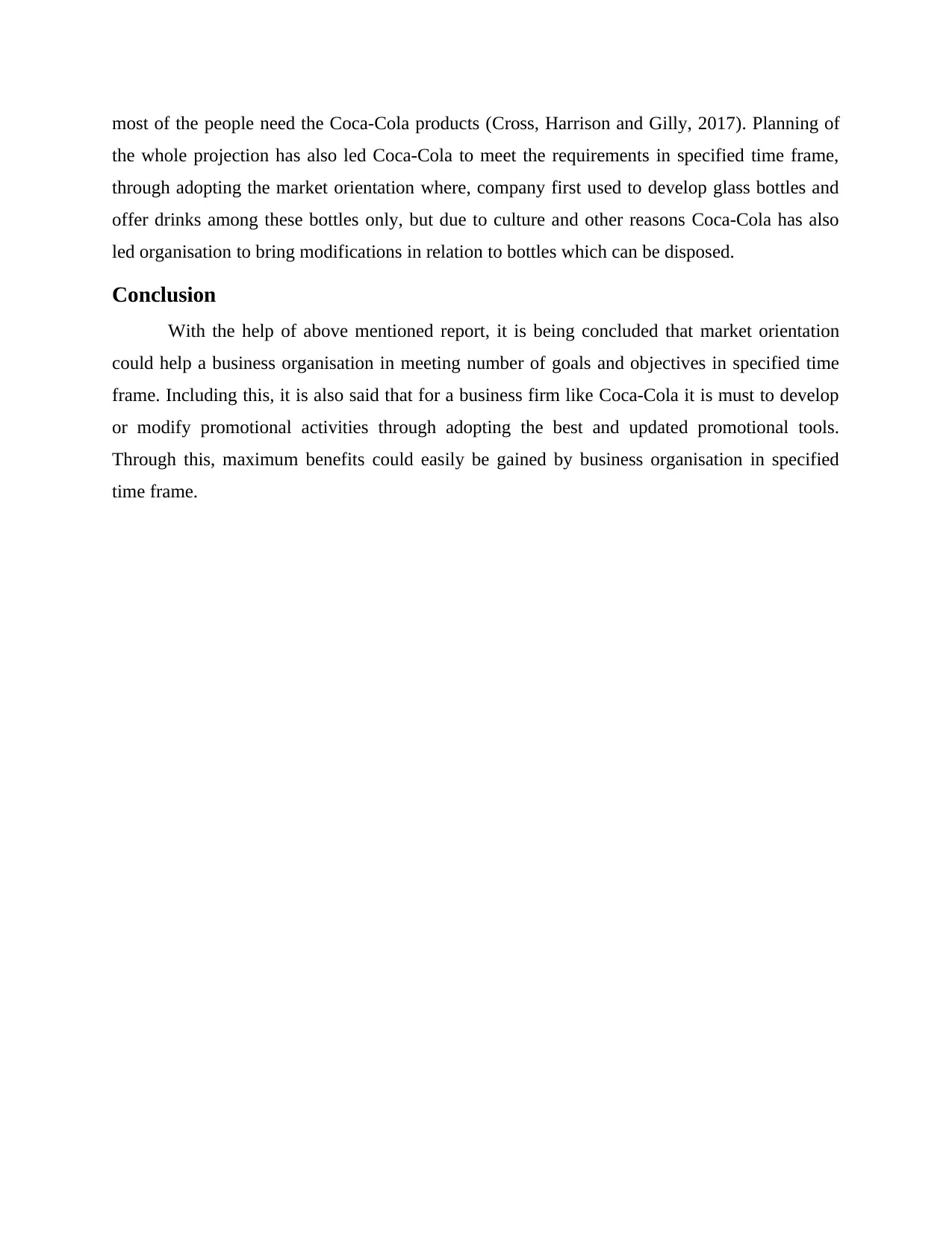
most of the people need the Coca-Cola products (Cross, Harrison and Gilly, 2017). Planning of
the whole projection has also led Coca-Cola to meet the requirements in specified time frame,
through adopting the market orientation where, company first used to develop glass bottles and
offer drinks among these bottles only, but due to culture and other reasons Coca-Cola has also
led organisation to bring modifications in relation to bottles which can be disposed.
Conclusion
With the help of above mentioned report, it is being concluded that market orientation
could help a business organisation in meeting number of goals and objectives in specified time
frame. Including this, it is also said that for a business firm like Coca-Cola it is must to develop
or modify promotional activities through adopting the best and updated promotional tools.
Through this, maximum benefits could easily be gained by business organisation in specified
time frame.
the whole projection has also led Coca-Cola to meet the requirements in specified time frame,
through adopting the market orientation where, company first used to develop glass bottles and
offer drinks among these bottles only, but due to culture and other reasons Coca-Cola has also
led organisation to bring modifications in relation to bottles which can be disposed.
Conclusion
With the help of above mentioned report, it is being concluded that market orientation
could help a business organisation in meeting number of goals and objectives in specified time
frame. Including this, it is also said that for a business firm like Coca-Cola it is must to develop
or modify promotional activities through adopting the best and updated promotional tools.
Through this, maximum benefits could easily be gained by business organisation in specified
time frame.
Paraphrase This Document
Need a fresh take? Get an instant paraphrase of this document with our AI Paraphraser
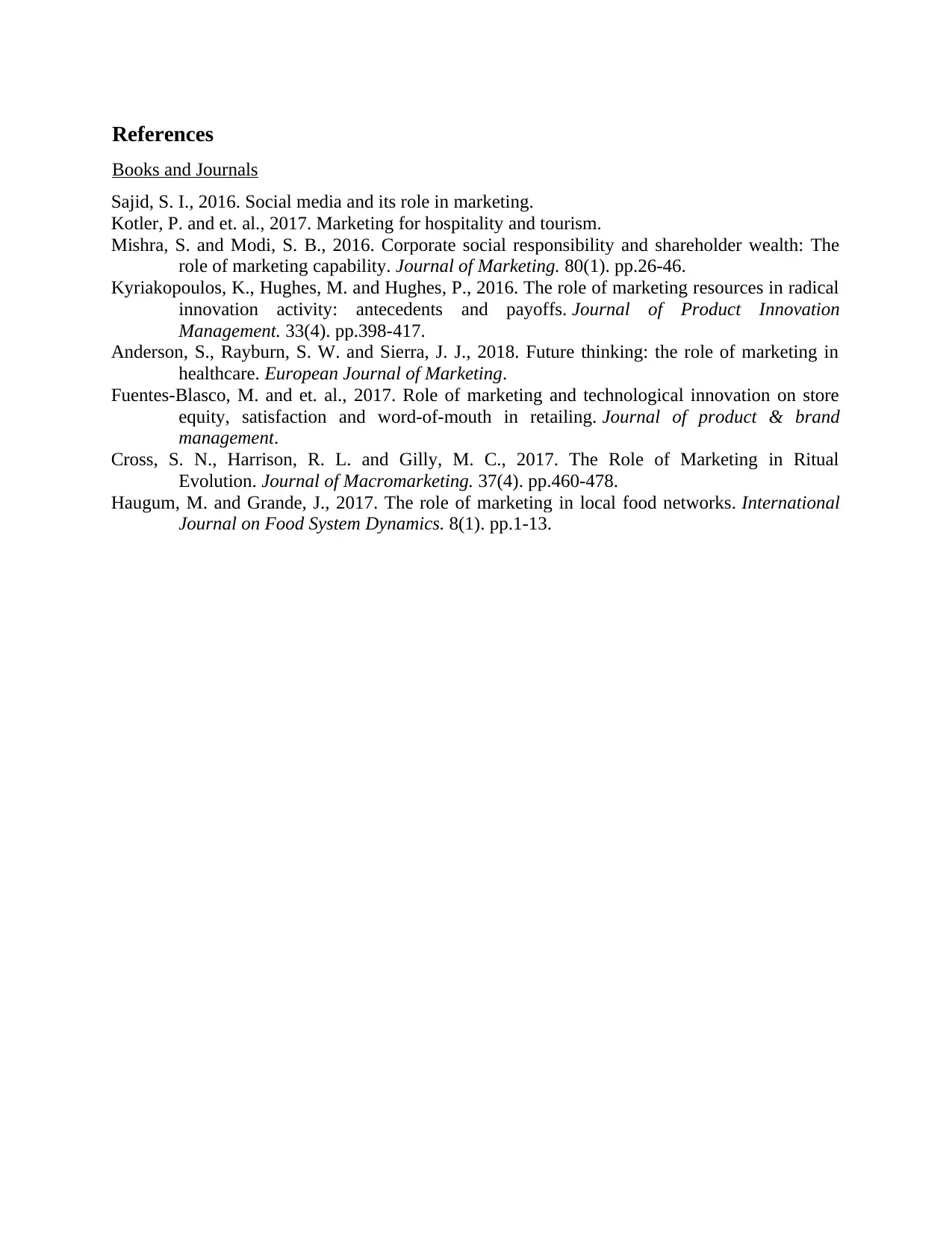
References
Books and Journals
Sajid, S. I., 2016. Social media and its role in marketing.
Kotler, P. and et. al., 2017. Marketing for hospitality and tourism.
Mishra, S. and Modi, S. B., 2016. Corporate social responsibility and shareholder wealth: The
role of marketing capability. Journal of Marketing. 80(1). pp.26-46.
Kyriakopoulos, K., Hughes, M. and Hughes, P., 2016. The role of marketing resources in radical
innovation activity: antecedents and payoffs. Journal of Product Innovation
Management. 33(4). pp.398-417.
Anderson, S., Rayburn, S. W. and Sierra, J. J., 2018. Future thinking: the role of marketing in
healthcare. European Journal of Marketing.
Fuentes-Blasco, M. and et. al., 2017. Role of marketing and technological innovation on store
equity, satisfaction and word-of-mouth in retailing. Journal of product & brand
management.
Cross, S. N., Harrison, R. L. and Gilly, M. C., 2017. The Role of Marketing in Ritual
Evolution. Journal of Macromarketing. 37(4). pp.460-478.
Haugum, M. and Grande, J., 2017. The role of marketing in local food networks. International
Journal on Food System Dynamics. 8(1). pp.1-13.
Books and Journals
Sajid, S. I., 2016. Social media and its role in marketing.
Kotler, P. and et. al., 2017. Marketing for hospitality and tourism.
Mishra, S. and Modi, S. B., 2016. Corporate social responsibility and shareholder wealth: The
role of marketing capability. Journal of Marketing. 80(1). pp.26-46.
Kyriakopoulos, K., Hughes, M. and Hughes, P., 2016. The role of marketing resources in radical
innovation activity: antecedents and payoffs. Journal of Product Innovation
Management. 33(4). pp.398-417.
Anderson, S., Rayburn, S. W. and Sierra, J. J., 2018. Future thinking: the role of marketing in
healthcare. European Journal of Marketing.
Fuentes-Blasco, M. and et. al., 2017. Role of marketing and technological innovation on store
equity, satisfaction and word-of-mouth in retailing. Journal of product & brand
management.
Cross, S. N., Harrison, R. L. and Gilly, M. C., 2017. The Role of Marketing in Ritual
Evolution. Journal of Macromarketing. 37(4). pp.460-478.
Haugum, M. and Grande, J., 2017. The role of marketing in local food networks. International
Journal on Food System Dynamics. 8(1). pp.1-13.
1 out of 8
Related Documents
Your All-in-One AI-Powered Toolkit for Academic Success.
+13062052269
info@desklib.com
Available 24*7 on WhatsApp / Email
![[object Object]](/_next/static/media/star-bottom.7253800d.svg)
Unlock your academic potential
Copyright © 2020–2026 A2Z Services. All Rights Reserved. Developed and managed by ZUCOL.





